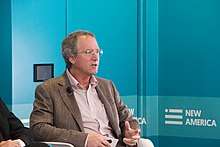David Relman
David Arnold Relman is an American microbiologist and the Thomas C. and Joan M. Merigan Professor in Medicine, and in Microbiology & Immunology at the Stanford University School of Medicine. His research focuses on the human microbiome and microbial ecosystem—for which he was a pioneer in the use of modern molecular methods, as well as on pathogen discovery and the genomics of host response.[1]
David A. Relman | |
|---|---|
 | |
| Alma mater | MIT, Harvard University Medical School |
| Known for | Study of the human microbiome |
| Awards | Institute of Medicine (2011) |
| Scientific career | |
| Fields | Microbiology |
| Institutions | Stanford University School of Medicine |
| Website | relman |
Education
Relman was born in Boston, raised in Lexington, MA, and then moved to Philadelphia where he attended Germantown Friends School. He was an undergraduate at MIT and graduated in 1977. He attended medical school at the Harvard University Medical School and received an M.D. degree, magna cum laude in 1982. He did his internship, residency, and a clinical infectious diseases fellowship year at Massachusetts General Hospital.[1] He completed his infectious diseases and microbiology research training as a postdoctoral fellow with Stanley Falkow at Stanford University. He began his independent career as a physician-scientist with a research focus in microbial pathogenesis and soon thereafter became interested in the discovery and identification of previously-unrecognized microbial pathogens. The problem of differentiating novel pathogens from normal microbiota, the diversity of the indigenous microbiota, and the relationship of the latter with human health and disease, formed the basis of his subsequent research career.[2]
Academic career
Relman joined the faculty at Stanford in 1994 and has remained there since.[3] His development of broad range small subunit rRNA gene amplification methods for revealing novel microbial pathogens led to the identification of several important previously-uncharacterized human pathogens, including the agents of bacillary angiomatosis and of Whipple's disease. He was an early pioneer in the study of the human microbiome using modern molecular methods, and published some of the first broad molecular surveys of the human oral and gut microbiota.[4][5] His current research seeks to elucidate the nature and basis of diversity, assembly, stability and resilience in the human microbial ecosystem, and their relationships with health and disease. Relman became the Thomas C. and Joan M. Merigan Professor at Stanford in 2009.
He has held a variety of leadership positions at Stanford: he is the co-director, along with Amy Zegart, of the Center for International Security and Cooperation,[6] and he is a senior fellow at both the Freeman Spogli Institute for International Studies and the Center for Innovation in Global Health. Relman serves as the Chief of Infectious Disease at the Veterans Affairs Palo Alto Health Care System.[1][7] Relman has also served in a number of United States government advisory capacities, particularly on biosecurity issues.[1][8]
Relman was elected a fellow of the American Academy of Microbiology in 2003, a fellow of the American Association for the Advancement of Science in 2010, and a member of the Institute of Medicine (National Academy of Medicine) in 2011. He has received the Pioneer Award (2006) and the Transformative Research Award (2013) from the National Institutes of Health. He served as the president of the Infectious Diseases Society of America in 2012-13.[1][8] He is currently chair of the Forum on Microbial Threats at the Institute of Medicine, and a member of the Committee on Science, Technology and Law, as well as the Intelligence Community Studies Board, at the National Academies of Science.
Personal life
Relman is the son of Arnold "Bud" Relman, longtime editor of the New England Journal of Medicine.[9]
Relman is a long-time volunteer for the Rock Medicine program organized by the Haight Ashbury Free Clinics, and has been the Chief Medical Officer for the program since 2006.[8] In the 1990s he was featured on MTV for his work there,[10] and he served as MTV's medical correspondent from 1995 to 1997.[11]
External links
- MicrobeWorld Interview with David Relman on the human microbiome
References
- "David A. Relman". Stanford University School of Medicine. Retrieved 24 August 2016.
- Taubes, Gary (September 2009). "David Relman: Featured Scientist Interview". ScienceWatch. Retrieved 24 August 2016.
- "David Relman". Freeman Spogli Institute for International Studies. Retrieved 24 August 2016.
- Kroes, Ian; Lepp, Paul; Relman, David (1999). "Bacterial diversity within the human subgingival crevice". Proc Natl Acad Sci U S A. 96 (25): 14547–52. doi:10.1073/pnas.96.25.14547. PMC 24473. PMID 10588742.
- Eckburg, Paul; Bik, Elisabeth; Bernstein, Charles; Purdom, Elizabeth; Dethlefsen, Les; Sargent, Michael; Gill, Steven; Nelson, Karen; Relman, David (2005). "Diversity of the human intestinal microbial flora". Science. 308 (5728): 1635–8. doi:10.1126/science.1110591. PMC 1395357. PMID 15831718.
- "Center for International Security and Cooperation". Freeman Spogli Institute. Retrieved 24 August 2016.
- "IDSA: Career Paths in ID - Academic Medicine". Infectious Disease Society. Retrieved 24 August 2016.
- "David Relman". David Relman Lab. Retrieved 24 August 2016.
- Marquard, Bryan (17 June 2014). "Dr. Arnold Relman, 91; ex-N.E. Journal of Medicine editor". Boston Globe. Retrieved 24 August 2016.
- Moretti, M. Mindy (29 October 1995). "MTV Mega-Dose". The Washington Post. Retrieved 24 August 2016.
- "David A. Relman, M.D." Antimicrobe.org. Retrieved 24 August 2016.